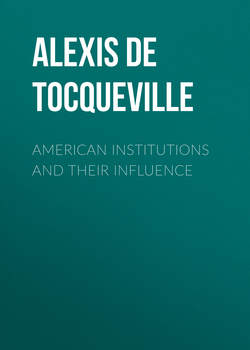Читать книгу American Institutions and Their Influence - Alexis de Tocqueville - Страница 25
AMERICAN INSTITUTIONS
CHAPTER VI
OTHER POWERS GRANTED TO THE AMERICAN JUDGES
ОглавлениеIn the United States all the Citizens have the Right of indicting the public Functionaries before the ordinary Tribunals.—How they use this Right.—Art. 75 of the An VIII.—The Americans and the English cannot understand the Purport of this Clause.
It is perfectly natural that in a free country like America all the citizens should have the right of indicting public functionaries before the ordinary tribunals, and that all the judges should have the power of punishing public offences. The right granted to the courts of justice, of judging the agents of the executive government, when they have violated the laws, is so natural a one that it cannot be looked upon as an extraordinary privilege. Nor do the springs of government appear to me to be weakened in the United States by the custom which renders all public officers responsible to the judges of the land. The Americans seem, on the contrary, to have increased by this means that respect which is due to the authorities, and at the same time to have rendered those who are in power more scrupulous of offending public opinion. I was struck by the small number of political trials which occur in the United States; but I have no difficulty in accounting for this circumstance. A lawsuit, of whatever nature it may be, is always a difficult and expensive undertaking. It is easy to attack a public man in a journal, but the motives which can warrant an action at law must be serious. A solid ground of complaint must therefore exist, to induce an individual to prosecute a public officer, and public officers careful not to furnish these grounds of complaint, when they are afraid of being prosecuted.
This does not depend upon the republican form of the American institutions, for the same facts present themselves in England. These two nations do not regard the impeachment of the principal officers of state as a sufficient guarantee of their independence. But they hold that the right of minor prosecutions, which are within the reach of the whole community, is a better pledge of freedom than those great judicial actions which are rarely employed until it is too late.
In the middle ages, when it was very difficult to overtake offenders, the judges inflicted the most dreadful tortures on the few who were arrested, which by no means diminished the number of crimes. It has since been discovered that when justice is more certain and more mild, it is at the same time more efficacious. The English and the Americans hold that tyranny and oppression are to be treated like any other crime, by lessening the penalty and facilitating conviction.
In the year VIII. of the French republic, a constitution was drawn up in which the following clause was introduced: "Art. 75. All the agents of the government below the rank of ministers can only be prosecuted for offences relating to their several functions by virtue of a decree of the conseil d'etat; in which case the prosecution takes place before the ordinary tribunals." This clause survived the "Constitution de l'an VIII.," and it is still maintained in spite of the just complaints of the nation. I have always found the utmost difficulty in explaining its meaning to Englishmen or Americans. They were at once led to conclude that the conseil d'etat in France was a great tribunal, established in the centre of the kingdom, which exercised a preliminary and somewhat tyrannical jurisdiction in all political causes. But when I told them that the conseil d'etat was not a judicial body, in the common sense of the term, but an administrative council composed of men dependent on the crown—so that the king, after having ordered one of his servants, called a prefect, to commit an injustice, has the power of commanding another of his servants, called a councillor of state, to prevent the former from being punished—when I demonstrated to them that the citizen who had been injured by the order of the sovereign is obliged to solicit from the sovereign permission to obtain redress, they refused to credit so flagrant an abuse, and were tempted to accuse me of falsehood or of ignorance. It frequently happened before the revolution that a parliament issued a warrant against a public officer who had committed an offence; and sometimes the proceedings were annulled by the authority of the crown. Despotism then displayed itself openly, and obedience was extorted by force. We have then retrograded from the point which our forefathers had reached, since we allow things to pass under the color of justice and the sanction of the law, which violence alone could impose upon them.
